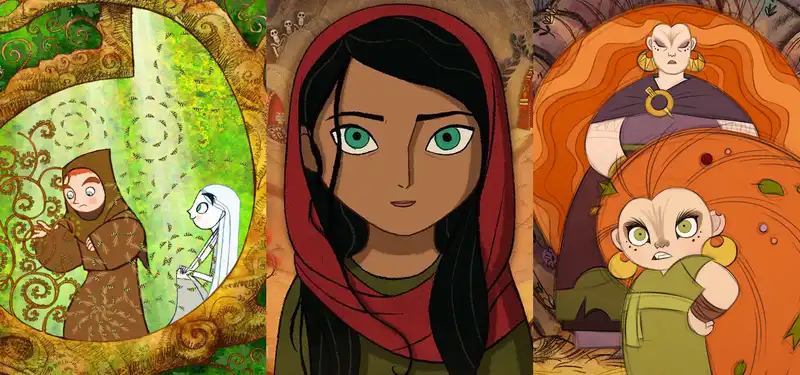Apr 1, 2024
Check out this anecdote-filled Q&A celebrating Cartoon Saloon's 25th anniversary.
Iconic Irish studio Cartoon Saloon celebrates its 25th anniversary this year, and to mark the occasion, founders Tom Moore, Nora Toomey, and Paul Young recently participated in a discussion at the British Film Institute.
The full discussion lasts just over 80 minutes and is highly entertaining for anyone interested in the history of cartoon saloons, the state of the European animation scene at any point in the past quarter century, or independent filmmaking. Below we have highlighted a few of the themes that struck us, and we encourage you to watch this discussion when you have time.
Moore, Toomey, and Young studied together at Ballyfermot College and began making films together at that time. Moore recalls: [Through the Young Irish Filmmakers, we organized a small, artist-funded project called the Millennium Arts and Culture Project. It was kind of a way to continue the collaborative work that we did when I was in college.
In one of the talk's funniest historical anecdotes, Moore says the creation of the Cartoon Saloon was indirectly facilitated by the closing of one of Ireland's most iconic animation houses. The original animation desk used by the saloon team after its launch was the one used by Jimmy Murakami's studio. When selling the furniture to a group of daring young animators, Murakami insisted to them that 2D animation was dying. Says Moore, "They all laughed at us buying all the old equipment so we could continue to do 2D hand-drawn animation."
The studio's first film was Toomey's "From the Darkness," which screened at important events such as the Galway Film Festival and the Annecy Film Festival. Says Toomey, "For us, it was a real jolt to be able to make something that could be seen by a wide audience." I think that's where that short film really knocked the kinks out of us." [According to Moore, the key to gaining the respect of other Irish labels was Cartoon Saloon's ability to team up with producers from other parts of Europe. I think that by finding a European co-production network and a way to get funding, we found a way to make a feature film almost like a big feature film. It was not a commercial attempt to sell toys, but an independent, art-house, animated film for families.
Asked why the studio was able to maintain its independence, Moore explained that Cartoon Saloon was a 2D studio at a time when CG was a more popular medium, so big commercial opportunities were less likely to present themselves and the studio could find its niche. There were always fewer commercials that we could pitch, like hand-drawn animation, and several other studios that were more established often worked on such commercials.
Toomey said that there was also a conscientious effort on the part of Cartoon Saloon to avoid entities that wanted too much control over the running of things: [21] [22] We backed away from people who would have changed the kinds of films we were working on or the kinds of projects we We did.
Asked what advice he would give his younger self if given the chance, Moore said he would try to convince himself to be more confident:
I would tell young Tom not to doubt so much. One of us was always optimistic, to encourage the other two.
Toomey chooses to avoid the potential butterfly effect and says he doesn't want to give his younger self any advice:
I wouldn't say anything. Especially "The Secret of Kells" or when I was sitting on the lawn outside Ballyfermot School looking at that painting. Because it takes a certain amount of naivete and absolute willpower.
From here, the conversation took on a more chronological, film-specific order as the trio talked about the Cartoon Saloon catalog and shared anecdotes and memories surrounding the development and production of the studio's most impressive titles.
.



Post your comment